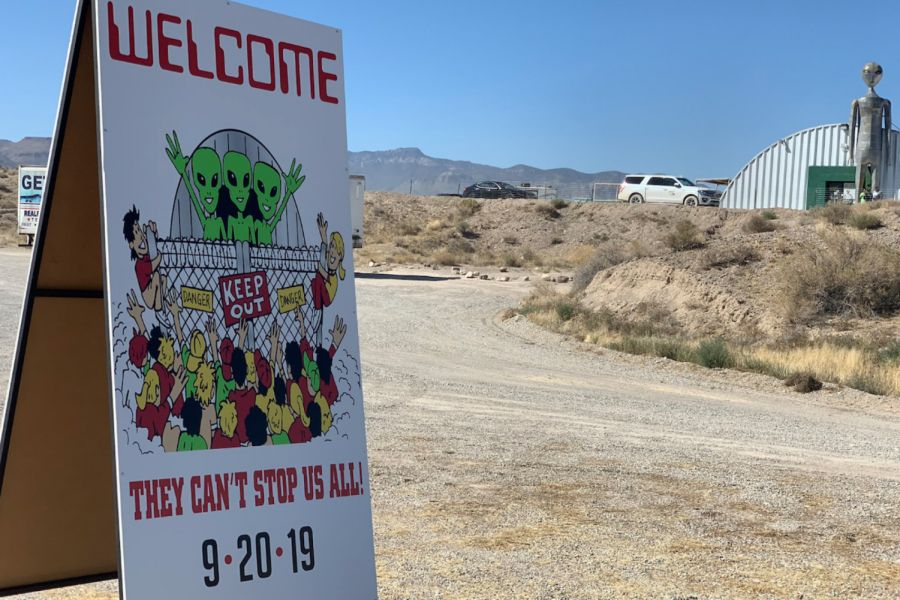Area 51 — lessons from the raid that wasn’t
More than two million people signed up on Facebook stating that they were going to raid Area 51 after the original post about it went up June 27.
This post spread like wildfire to every corner of the internet, including every teacher’s favorite website, Wikipedia, which now has an Area 51 Raid page, and every non-VSCO girl’s worst nightmare, TikTok.
The Facebook page was obviously a joke, with claims such as, “If we Naruto run, we can move faster than their bullets. Let’s see them aliens.” However, the creator of the Facebook page quickly realized that people would actually show up (honestly, what did he expect?), so he decided instead to turn the raid into a music festival that he calls Alienstock.
By that time the post had gone viral, however, and meme culture took it to the next level. About two days after the post went viral, copycat raids such as raiding the White House, the Immigrant Detention Centers, or the Education Implementation Office Headquarters started to pop up all over the Internet. The sudden spread was significant enough to warrant a response from the Air Force.
Laura McAndrews, spokeswoman for the Air Force, when speaking to the Washington Post, said that they were very aware of the raid, and they issued a warning: “[Area 51] is an open training range for the U.S. Air Force, and we would discourage anyone from trying to come into the area where we train American armed forces. The U.S. Air Force always stands ready to protect America and its assets.”
The real-world response from an official organization only furthered the online event. A day later on Reddit, a post showed what they claimed to be a briefing for the Air Force on what Naruto Running looks like.
The Air Force has enough resources in place at Area 51 that they probably don’t have to change much, if anything, in response to an Internet fad. For smaller organizations, though, the potential for a meme to turn into action causes much more concern.
Lincoln County, where area 51 is located, is extremely small population-wise, and obviously does not have the infrastructure to be able to hold even 1 million people — just half of the number of people who said they were going. The music festival was given a permit and county Sheriff Kerry Lee said that an extra 150 police officers and 300 paramedics would be brought in from across the state.
The town put out a statement reminding the festival-goers that if they are going, they need to be prepared for the harsh conditions of the desert, warning about dehydration and claiming that the town won’t be able to provide anything close to an adequate amount of food for the attendees.
The town of Rachel, population just 56, has had businesses open up their land for RVs and campers, other businesses are stocking up on merchandise to sell other companies, and musicians are marketing off of the success of the raid, such as Little Nas X for Budwiser. Arby’s even created a new menu for the event.
Not everyone was on board with the sudden popularity of the event. The creator moved the music festival — due to the lack of infrastructure and the fact that this could potentially turn into Fyre Festival 2.0 — to a place outside of Las Vegas, and warned that he was not responsible anymore for whatever happens to Area 51. Two YouTubers were later arrested for attempting to get into Area 51 around the planned time of the raid.
In Rachel, the population of the town more than doubled when about 75 people went to the Area 51 gate and more started to arrive. According to the Associated Press, at least two people were detained by the sheriffs, and one of the people detained was arrested. Beyond that, there were no major incidents and those who gathered at the gate mostly made jokes and took photos. At Alienstock in Las Vegas, according to people who went, it ran like a normal EDM music festival, just with a ton of alien inflatables.
While the Area 51 raid itself turned into a non-event, it showed the power of memes and Internet communities. Meme culture has a much bigger impact on us and the world than most people think.
Another example of the influence of memes in real life would be in China, where #metoo activists who were censored by the government called the movement “rice bunnies” because in Mandarin, “rice bunny” is pronounced like “me too.” The common language of online communities can help people rally around ideas and freedom.
Meme culture also can shift very fast — some memes last hours and some last years. The raid meme is now only ranked at 1/100 on Google trends, but when the post was first went viral it was 100/100, and when the raid happened it was 87/100. It can be hard to determine what impact a meme will have in the real world when millions of people engage with it in a superficial way.
The big question, though, is could something worse happen because of memes? This event had all the makings of a disaster, but some people were able to realize the damage that could happen and were able to steer it away from that. What if we’re not so lucky in the future?

